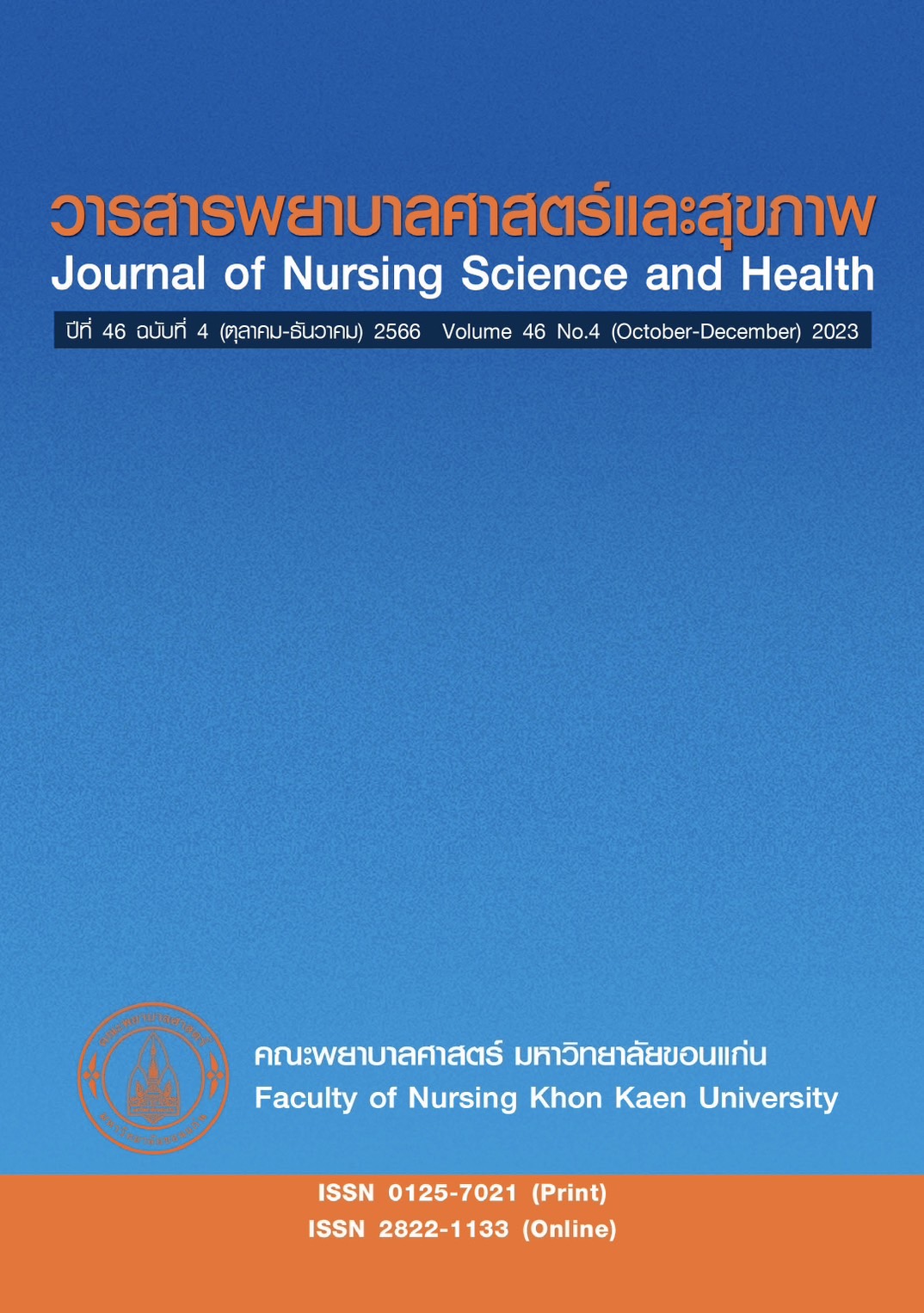ความสัมพันธ์ระหว่างปัจจัยส่วนบุคคล ปัจจัยสิ่งแวดล้อมและแบบแผนความเชื่อด้านสุขภาพกับพฤติกรรมการป้องกันโรคโควิด-19 ของนักศึกษาระดับปริญญาตรี
คำสำคัญ:
นักศึกษาระดับปริญญาตรี, แบบแผนความเชื่อด้านสุขภาพ, พฤติกรรมการป้องกันโรคโควิด-19บทคัดย่อ
การศึกษาวิเคราะห์แบบภาคตัดขวาง (cross-sectional analytical research) มีวัตถุประสงค์เพื่อ ศึกษาความสัมพันธ์ระหว่างปัจจัยส่วนบุคคล ปัจจัยสิ่งแวดล้อม และแบบแผนความเชื่อด้านสุขภาพกับพฤติกรรม การป้องกันโรคโควิด-19 ของนักศึกษาระดับปริญญาตรี กลุ่มตัวอย่าง จำนวน 1,482 รายได้มาจากการสุ่มโดย วิธี multistage random sampling เครื่องมือที่ใช้คือแบบสอบถามเกี่ยวกับปัจจัยส่วนบุคคล ปัจจัยสิ่งแวดล้อม แบบแผนความเชื่อด้านสุขภาพ และพฤติกรรมการป้องกันโรคโควิด-19 โดยมีค่าความเชื่อมั่นของเครื่องมือ 0.87 เก็บข้อมูลโดยใช้ google form ผ่าน QR code scanning วิเคราะห์ข้อมูลโดยใช้สถิติ multiple logistic regression
ผลการศึกษาพบว่า ปัจจัยที่มีอิทธิพลต่อพฤติกรรมการป้องกันโรคโควิด-19 คือ ปัจจัยส่วนบุคคล และแบบแผนความเชื่อด้านสุขภาพ ด้านปัจจัยส่วนบุคคลพบว่า กลุ่มอายุระหว่าง 18-20 ปี มีพฤติกรรม การป้องกันโรคโควิด-19 มากกว่ากลุ่มอายุ 21 ปีขึ้นไป 12.62 เท่า (Adjusted OR=18.66, 95%CI=5.50- 63.21, P-Value<0.001) และปัจจัยด้านแบบแผนความเชื่อด้านสุขภาพพบว่า การรับรู้โอกาสเสี่ยงต่อโควิด ในระดับมากมีพฤติกรรมการป้องกันโรคโควิด-19 มากกว่าการรับรู้โอกาสเสี่ยงระดับปานกลาง 7.64 เท่า (AdjustedOR=3.04,95%CI=1.60-5.76,P-Value0.001)การรับรู้ประโยชน์ของการป้องกันโรคโควิด-19อยู่ใน ระดับมากมีพฤติกรรมการป้องกันโรคโควิด-19 มากกว่าการรับรู้ประโยชน์ของการป้องกันโรคโควิด-19 ระดับปานกลาง 16.35 เท่า (Adjusted OR=4.57, 95%CI=2.21-9.42, P-Value<0.001) การรับรู้ความสามารถ ของตนเองในการป้องกันโรคโควิด-19 อยู่ในระดับมากมีพฤติกรรมการป้องกันโรคโควิด-19 มากกว่าการรับรู้ ความสามารถของตนเองในการป้องกันโรคโควิด-19 อยู่ในระดับปานกลาง 12.19 เท่า (Adjusted OR=2.53, 95%CI=1.24-5.18, P-Value 0.01) และกลุ่มที่มีสิ่งชักนำให้เกิดการปฏิบัติอยู่ในระดับมากมีพฤติกรรม การป้องกันโรคโควิด-19 มากกว่ากลุ่มที่มีสิ่งชักนำให้เกิดการปฏิบัติระดับปานกลาง 8.33 เท่า (Adjusted OR= 3.58, 95%CI =1.88-6.84, P-Value<0.001)
จากผลการศึกษาเสนอแนะว่าควรจัดอบรม ให้ความรู้ ความเข้าใจ เกี่ยวกับเรื่องพฤติกรรมการป้องกัน โรคโควิด-19 ให้กับกลุ่มที่มีอายุมากกว่า 21 ปีขึ้นไป เพื่อให้นักศึกษามีความรู้ความเข้าใจมากขึ้น ควรสร้าง ความตระหนักรู้ให้นักศึกษากลุ่มนี้มีพฤติกรรมป้องกันการติดเชื้อโรคโควิด-19 โดยเน้นถึงประโยชน์และส่งเสริม การรับรู้อุปสรรคของการปฏิบัติ วางแผน และการปรับเปลี่ยนพฤติกรรมสุขภาพที่เหมาะสม
เอกสารอ้างอิง
Department of health, Ministry of Public Health. CORONA-VIRUS [Internet] Department of health; 2020. Available from: https://anamai.moph.go.th/
Department of disease control, Ministry of Public Health. D-M-H-T-T [Internet]. Bangkok: Department of disease control; 2022 Available from: https://ddc.moph.go.th/
Morasakul B, Punthasee P. Knowledge and prevention behaviors regarding COVID-19 among the first-year nursing students of Saint Theresa international college and Saint Louis college. RHPC9 Journal 2021;15(37):179-95. (in Thai)
Al-Hanawi MK, Angawi K, Alshareef N, Qattan AM, Helmy HZ, Abudawood Y, et al. Knowledge, attitude and practice toward COVID-19 among the public in the kingdom of Saudi Arabia: A cross-sectional study. Front Public Health 2020; 8:217. doi.org/10.3389/fpubh.2020.00217
Kaewsuksai R, Kongkun P, Tongkoop B, Samaair L, Boonnarakorn, S. Relationships between knowledge, perception and the new normal behaviors for preventing coronavirus cisease (COVID-19) infection among people in Narathiwat province. SCNJ 2021;8(2):67-79. (in Thai)
Chuaelee S. Knowledge and protection behaviors Covid 19 epidemic disease: Case study of a college of public health in Ubonratchathani province. Ubon Ratchathani: Sirindhron College of Public Health; 2022.
Rungnoei N. Factors predicting COVID-19 preventive behaviors among intermediate school students. Mueng, Narathiwat, PNUJR 2022;14(2):17-37. (in Thai)
Katanyutanon T, Thongsiri T, Pichitchainarong A, Kingdokmai T, Thammakul S, Saenkamrang P, et al. Factors related to COVID-19 preventive behaviors among health science students of Huachiew Chalermprakiet University. Huachiew Chalermprakiet Sci Technol J 2021;7(1):8-20. (in Thai)
Kruttakart S, Phianthanyakam N, Wannapo P,Rungnoei N, Kullaboot S. Factors predicting monitoring and preventive behaviors of Covid-19 among nursing students. BCNNON Health Science Research Journal 2022;16(3):86–97. (in Thai)
Ruankon A, Sroisong S, Fuongtong P, Teerapong N. The influence of knowledge and risk perception on preventive behavior regarding COVID-19 outbreak among nursing students. J Health & Health Manag 2021;7(2):183-95. (in Thai)
Thipsut T, Bunthan W, Turongruang S, Rungruang J, Choosrithong R, Kramulroj N, et al. Factors affecting the health promoting behaviors to coronavirus disease 2019 (COVID-19) infecting prevention of the first-year students in Huachiew Chalermprakiet University. HCU Journal [Internet]. 2021 Dec. 28 [cited 2023 Nov 23];25(2): 168-79. Available from: https://he01. tci-thaijo.org/index.php/HCUJOURNAL/ article/view/250563 (in Thai)
Becker MH. The health belief model and personal health behavior. N.J.: C. B. Slack; 1974
Chidnayee S. Knowledge and preventive behaviors towards the covid-19 among nursing students in Boromarajonani College of Nursing. Chiang Mai: Boromarajonani College of Nursing; 2021. (in Thai)
Karlsson LC, Soveri A, Lewandowsky S, Karlsson L, Karlsson H, Nolvi S, et al. Fearing the disease or the vaccine: The case of COVID-19. Pers Individ Dif. 2021 Apr; 172:110590. doi: 10.1016/j.paid.2020. 110590Epub2020Dec14.PMID:33518869; PMCID: PMC7832025.
wajanatinapart P, Waisantia J, Kongkaew P, Inkaew P, Paso P. The relationship between health beliefs and health behaviors to prevent coronavirus infection of the staff and students in Suranaree University of Technology [Research reports]. Nakhon Ratchasima: Suranaree University of Technology; 2022. Available from: http://sutir.sut.ac.th:8080/ jspui/handle/123456789/9517 (in Thai)
Waedueramae R, Kaewsuksai R, Kongkun P, Suwankanjana A, Chaiprasit K. Relationship betweenknowledge,perceptionand“newnormal behaviors” on COVID-19 prevention among nursing students, Faculty of Nursing, Princess of Narathiwat University. SCNJ 2021;8(2): 80-92. (in Thai)
ดาวน์โหลด
เผยแพร่แล้ว
รูปแบบการอ้างอิง
ฉบับ
ประเภทบทความ
สัญญาอนุญาต
ลิขสิทธิ์ (c) 2023 วารสารพยาบาลศาสตร์และสุขภาพ

อนุญาตภายใต้เงื่อนไข Creative Commons Attribution-NonCommercial-NoDerivatives 4.0 International License.
วารสารพยาบาลศาสตร์และสุขภาพเป็นเจ้าของลิขสิทธิ์ในการเผยแพร่ผลงานที่ตีพิมพ์ห้ามผู้ใดนำบทความที่ได้รับการตีพิมพ์ในวารสารพยาบาลศาสตร์และสุขภาพไปเผยแพร่ในลักษณะต่าง ๆ ดังนี้ การนำบทความไปเผยแพร่ออนไลน์ การถ่ายเอกสารบทความเพื่อกิจกรรมที่ไม่ใช่การเรียนการสอน การส่งบทความไปตีพิมพ์เผยแพร่ที่อื่น ยกเว้นเสียแต่ได้รับอนุญาตจากวารสารพยาบาลศาสตร์และสุขภาพ



